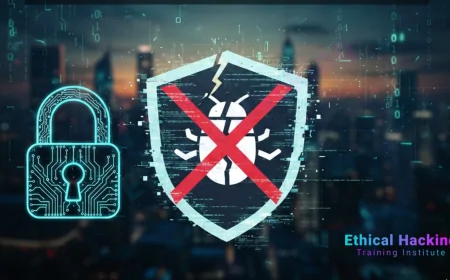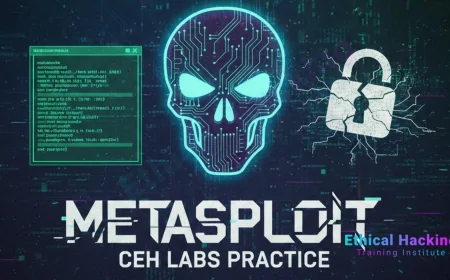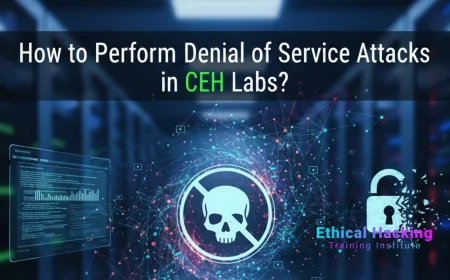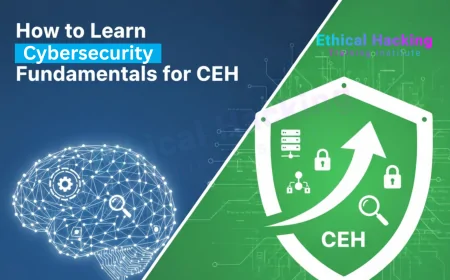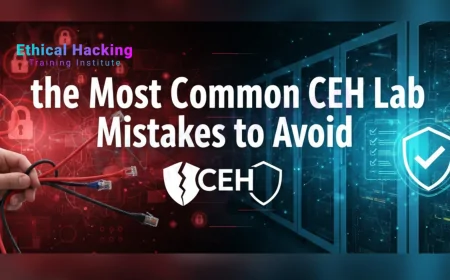CHFI V11: New Updates and Features in the Latest Certification Version | CHFI V11 Explained: Features, Updates, and Certification Changes
Discover what's new in CHFI v11, EC-Council's updated digital forensic certification. Learn about modules, tools, labs, exam, and key features.
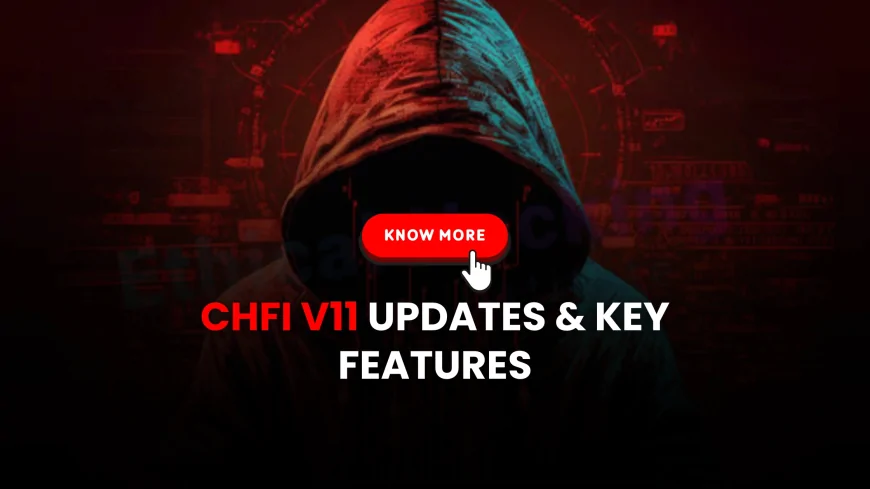
Table of Contents
- Introduction
- What is CHFI v11?
- Why EC-Council Released CHFI v11
- Key Changes and New Features in CHFI v11
- New and Updated Modules in CHFI v11
- Forensic Tools and Labs in v11
- CHFI v11 Exam Details
- Who Should Take CHFI v11?
- Benefits of CHFI v11 Certification
- Comparison: CHFI v11 vs v10
- FAQs
- Conclusion
Introduction
Digital crime is on the rise, and organizations need professionals who can investigate, analyze, and document cybercrime evidence. The EC-Council's Certified Hacking Forensic Investigator (CHFI) certification remains one of the most comprehensive and respected credentials in digital forensics. In its latest evolution, CHFI v11 brings advanced content, modern case studies, and updated labs that reflect today’s cybersecurity threats and forensic investigation tools.
What is CHFI v11?
CHFI v11 stands for Certified Hacking Forensic Investigator version 11, the latest release of the EC-Council’s globally recognized digital forensics certification. It is a comprehensive training and certification program designed to equip cybersecurity professionals with advanced skills to:
-
Investigate cybercrimes
-
Collect and preserve digital evidence
-
Analyze compromised systems
-
Present findings in court-compliant formats
CHFI v11 is a significant upgrade from its predecessor, CHFI v10, featuring:
-
New modules on dark web forensics, cloud forensics, IoT, malware analysis, and memory forensics
-
20+ updated labs using industry tools like FTK Imager, Volatility, Autopsy, and more
-
Enhanced focus on legal regulations like GDPR, HIPAA, and CCPA
-
Modern case studies reflecting today’s advanced threats and real-world scenarios
It prepares professionals to become capable digital forensic investigators ready to work in law enforcement, enterprise security teams, incident response units, or as independent consultants.
Why EC-Council Released CHFI v11
The EC-Council released CHFI v11 to align the certification with the rapid evolution of cybercrime techniques, digital evidence sources, and global legal frameworks. As cyber threats grow in complexity, traditional forensic methods taught in earlier versions like CHFI v9 and v10 were no longer sufficient to address the needs of modern digital investigations.
Here are the key reasons behind the launch of CHFI v11:
1. Emergence of Advanced Cyber Threats
-
Cybercriminals now use fileless malware, zero-day exploits, encrypted communication, and ransomware-as-a-service (RaaS).
-
CHFI v11 includes labs and modules to investigate such sophisticated threats.
2. Explosion of Cloud & Hybrid Environments
-
Organizations are moving to cloud, SaaS, and multi-cloud platforms.
-
CHFI v11 introduces cloud forensics techniques and tools tailored for platforms like AWS, Azure, and Google Cloud.
3. Need for Mobile, IoT & Edge Forensics
-
The previous CHFI versions lacked sufficient focus on mobile device forensics, IoT forensics, and edge computing environments.
-
v11 fills this gap with practical labs and new modules.
4. Updated Global Compliance and Legal Frameworks
-
Data privacy regulations like GDPR, HIPAA, and CCPA require investigators to follow strict chain-of-custody procedures.
-
CHFI v11 emphasizes legal readiness, making the certification globally relevant.
5. Demand for Hands-On, Tool-Based Training
-
Digital forensics is highly practical, and professionals need real-world, lab-based exposure.
-
CHFI v11 includes 20+ hands-on labs, modern forensic tools, and scenario-based training via EC-Council’s iLabs platform.
6. Bridging Skill Gaps in Incident Response and Forensics
-
There is a global shortage of trained forensic professionals.
-
CHFI v11 addresses this by offering up-to-date knowledge and job-role alignment with current industry needs.
Key Changes and New Features in CHFI v11
Here are some of the most important upgrades in CHFI v11:
- Updated case studies based on current attack types and tools
- 20+ new forensic labs added using the latest tools and frameworks
- Enhanced cloud, IoT, and malware analysis scenarios
- Refreshed modules with detailed hands-on simulations and forensics frameworks
- Greater focus on legal frameworks like GDPR, HIPAA, and CCPA
New and Updated Modules in CHFI v11
CHFI v11 introduces several new modules while updating previous ones for better coverage. Some notable inclusions are:
- Dark Web Forensics
- Memory Forensics
- Steganography and Anti-forensics Techniques
- Cloud and SaaS Forensics
- Malware Behavioral Analysis
- Linux, IoT, and Mobile Device Forensics
Forensic Tools and Labs in v11
CHFI v11 includes hands-on labs powered by EC-Council’s iLabs platform. New tools introduced in the v11 edition include:
- FTK Imager
- Autopsy
- Wireshark
- Volatility
- Oxygen Forensic Suite
- X-Ways Forensics
- AccessData Forensics Toolkit
CHFI v11 Exam Details
- Exam Code: 312-49
- Format: Multiple Choice
- No. of Questions: 150
- Duration: 4 hours
- Delivery: ECC Exam or Pearson VUE
- Passing Score: Determined via cut-score method
Who Should Take CHFI v11?
This certification is ideal for:
- Digital Forensics Analysts
- Cybercrime Investigators
- Network Security Professionals
- Incident Responders
- Law Enforcement Personnel
- Legal Professionals in Cyber Law
Benefits of CHFI v11 Certification
Earning CHFI v11 certification offers multiple professional advantages:
- High credibility in cybersecurity and law enforcement sectors
- Enhanced knowledge in forensic tools and chain of custody
- Opportunity to work in high-paying digital forensic roles
- Access to EC-Council’s global community and job boards
Comparison: CHFI v11 vs CHFI v10
| Feature | CHFI v10 | CHFI v11 |
|---|---|---|
| Modules | 14 | 16+ |
| Cloud & IoT Focus | Minimal | Expanded |
| Labs | Standard | Updated with 20+ new labs |
| Legal Compliance | General | Includes GDPR, HIPAA, CCPA |
| Tools | Older Set | Modern Forensic Toolkits |
Frequently Asked Questions (FAQs)
1. What does CHFI v11 stand for?
CHFI v11 stands for Certified Hacking Forensic Investigator, version 11—EC-Council’s latest digital forensics certification.
2. What’s new in CHFI v11?
CHFI v11 includes updated modules, tools, cloud forensics, IoT, malware analysis, and over 20 new labs with practical simulations.
3. Is CHFI v11 harder than v10?
It is more comprehensive and hands-on, but not necessarily harder if you're prepared with hands-on training.
4. Who should pursue CHFI v11?
Cybersecurity professionals, incident responders, forensic investigators, and legal experts in cybercrime should consider this course.
5. How do I get CHFI v11 certified?
Enroll in official training, prepare using labs and resources, and pass the 312-49 exam via Pearson VUE or EC-Council Exam Center.
6. How long does the CHFI v11 exam take?
The exam is 4 hours long and includes 150 multiple-choice questions.
7. What tools are taught in CHFI v11?
Autopsy, FTK Imager, Wireshark, Volatility, X-Ways, and more modern forensic tools.
8. Are there any prerequisites for CHFI v11?
No strict prerequisites, but knowledge of cybersecurity or CEH-level experience is recommended.
9. Can I take CHFI v11 online?
Yes, both training and the exam can be completed online through EC-Council’s platforms or authorized partners.
10. Is CHFI v11 valid globally?
Yes, it is recognized internationally in both public and private cybersecurity sectors.
11. What are the benefits of CHFI v11?
Professional credibility, forensic investigation skills, legal knowledge, and job opportunities in cybersecurity.
12. What are the job roles after CHFI v11?
Digital Forensic Analyst, Cybercrime Investigator, Security Auditor, and more.
13. How do CHFI v11 labs work?
They are cloud-based virtual labs provided via iLabs, simulating real-world investigation scenarios.
14. What format is the CHFI v11 exam?
Multiple-choice questions with scenario-based analysis across four hours.
15. Can CHFI v11 help with court evidence handling?
Yes, it includes modules on legal processes, chain of custody, and compliance regulations.
16. Is there a bootcamp for CHFI v11?
Yes, EC-Council and partners offer bootcamps both online and offline to fast-track your learning.
17. How often is the CHFI syllabus updated?
Approximately every 2–3 years based on cybersecurity threat trends and legal regulations.
18. How long is CHFI v11 valid?
It is valid for 3 years and can be renewed through EC-Council’s Continuing Education Program.
19. What is the cost of CHFI v11?
Training and exam packages can cost between $2,000 and $3,500 depending on the provider.
20. What’s the difference between CEH and CHFI?
CEH focuses on ethical hacking, while CHFI is about forensic investigation and post-breach analysis.
Conclusion
CHFI v11 is more than just an upgrade; it’s a transformation of digital forensic education. It’s built to meet today’s threats head-on, with real-world tools, hands-on labs, and deeply enriched content. Whether you’re entering digital forensics or advancing in your cybersecurity career, CHFI v11 positions you as a serious expert in the industry.
What's Your Reaction?
 Like
0
Like
0
 Dislike
0
Dislike
0
 Love
0
Love
0
 Funny
0
Funny
0
 Angry
0
Angry
0
 Sad
0
Sad
0
 Wow
0
Wow
0
